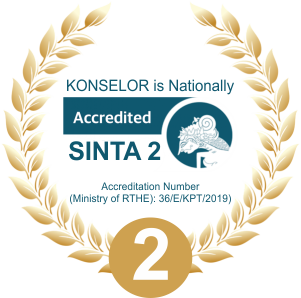Efficacy of religious integrated counselling in fostering hospitality and religious harmony in Nigeria: counsellors’ perspective
 ),
), (1) Lagos State University, Ojo, Nigeria
 Corresponding Author
Corresponding Author
Copyright (c) 2020 Afolasade Airat Sulaiman
DOI : https://doi.org/10.24036/0202093110077-0-00
Full Text:
 Language : en
Language : en
Abstract
This study surveyed counsellor’s opinion on the efficacy of religious integrated counselling in fostering hospitality and religious harmony in Nigeria. The sample for the study was 120, Counselling for Hospitality and Religious Harmony Questionnaire (CHRHQ) was used for data collection Content Validity Index of CHRHQ was 0.85 and 0.87 reliability. Majority agreed that integrated religious counselling could foster hospitality and encourage religious harmony through competent and appropriate use of different skills and techniques. Also, majority had integrated religion into counselling. No sex difference was found on counsellors’ perception of ways to foster hospitality and religious harmony through counselling, but sex difference exists in the integration of religion into counselling. It was therefore recommended that learning about different religions should become part of counsellors’ training; every mainstream counsellor must take a course in the two major religions – Christianity and Islam, and massive enlightenment programmes through the media are required.
References
Association for Spiritual, Ethical, and Religious Values in Counselling. (2009). Competencies for integrating spirituality into counselling. Retrieved from http://www.aservic.org/resources/spiritual-competencies
Al-Thani A. S. (2012). An Islamic modification of the person-cantered counselling approach. Retrieved from QScience.com Qatar.
Basedau, M., Vullers, J., &Korner, P. (2013). What drives inter-religious violence? Lessons from Nigeria, Cˆote d’Ivoire, and Tanzania. Studies in Conflict & Terrorism, 36, 857–879.
Behrens, R. D., & Terrill, J. L. (2011). The navigation of spiritual mindfulness. Retrieved from http://counselingoutfitter.com/vistas/vistas11/Article_100.pdf
Cooper, J. (2010). Essential crisis intervention skills. In L. R. Jackson-Cherry & B. T. Erford (Eds.), Crisis assessment, intervention, and prevention (pp. 55–71). New York, NY: Pearson.
Dailey, S. F., Curry, J. R., Harper, M. C., Hartwig Moorhead, H. J., & Gill, C. S. (2011). Exploring the spiritual domain: Tools for integrating spirituality and religion into Counselling. Retrieved from http://counselingoutfitters.com/vistas/vistas11/Article
Hathaway, W.L., Scott, S.Y., &Garver, S.A. ((2004). Assessing religious/spiritual functioning: A neglected domain in clinical practice? Professional Psychology: Research and Practice, 35, 97-104.
Hook, J. N., Worthington Jr, E. L., Davis, D. E., & Atkins, D. C. (2014). Religion and couple therapy: Description and preliminary outcome data. Psychology of Religion and Spirituality, 6, 94-101. doi: 10.1037/a0035412
Kennedy, G. A., Macnab, F. A. & Ross, J. J. (2015). The effectiveness of spiritual/religious interventions in psychotherapy and counselling: A review of the recent literature. Melbourne: PACFA.
Koenig, H. G. (2012). Religion, spirituality, and health: The research and clinical implications. ISRN Psychiatry. Retrieved from http://www.hindawi.com/journals/isrn/2012/278730/abs/
Maregere, T. P. (2011). Religion: A source of conflict and a resource for peace. Conflict Trends 1, 17–23.
Morgen, K., Morgan, O. J., Cashwell, C., & Miller, G. (2010). Strategies for the competent integration of spirituality into addictions counseling training and supervision. Retrieved from http://counselingoutfitters.com/vistas/vistas10/Article84.pdf
Paukert, A. L., Phillips, L. L., Cully, J. A., Romero, C. & Stanley, M. A. (2011). Systematic review of the effects of religion-accommodative psychotherapy for depression and anxiety. Journal of Contemporary Psychotherapy, 41, 99-108. doi 10.1007/s10879-010-9154-0
Pearce M. (2016). Cognitive behavioural therapy for Christians with depression: A practical tool-based primer. USA: Templeton Press.
Raiya, H. A., &Pargament, K. I. (2010). Religiously integrated psychotherapy with Muslim clients: From research to practice. Professional Psychology: Research and Practice, 41(2), 181-188.
Shah, R., Kulhara, P., Grover, S., Kumar, S., Malhotra, R., &Tyagi, S. (2011). Relationship between spirituality/religiousness and coping in patients with residual schizophrenia. Quality of Life Research, 20, 1053-1060. doi:10.1007/s11136-010-9839-6
Sulaiman, A. A. (2019). Religious-integrated counselling: a panacea for religious harmony in Nigeria. Interdisciplinary Journal of Education, 2(1), 58-73.
Vieten, C. S., Pilato, R., Pargament, K. I., & Lukoff, D. (2013). Spiritual competencies for psychologists. Psychology of Religion and Spirituality, 1-61 Retrieved from http://psycnet.apa.org/psycinfo/2013-20580-001
Worthington, E. L. Jr., &Sotoohi, G. (2010). Physiological assessment of forgiveness, grudges, and revenge: Theories, research methods, and implications. International Journal of Psychology Research, 5(3/4), 291–316.
 Article Metrics
Article Metrics
 Abstract Views : 501 times
Abstract Views : 501 times
 PDF Downloaded : 81 times
PDF Downloaded : 81 times
Refbacks
- There are currently no refbacks.
Copyright (c) 2020 Afolasade Airat Sulaiman

This work is licensed under a Creative Commons Attribution 4.0 International License.







